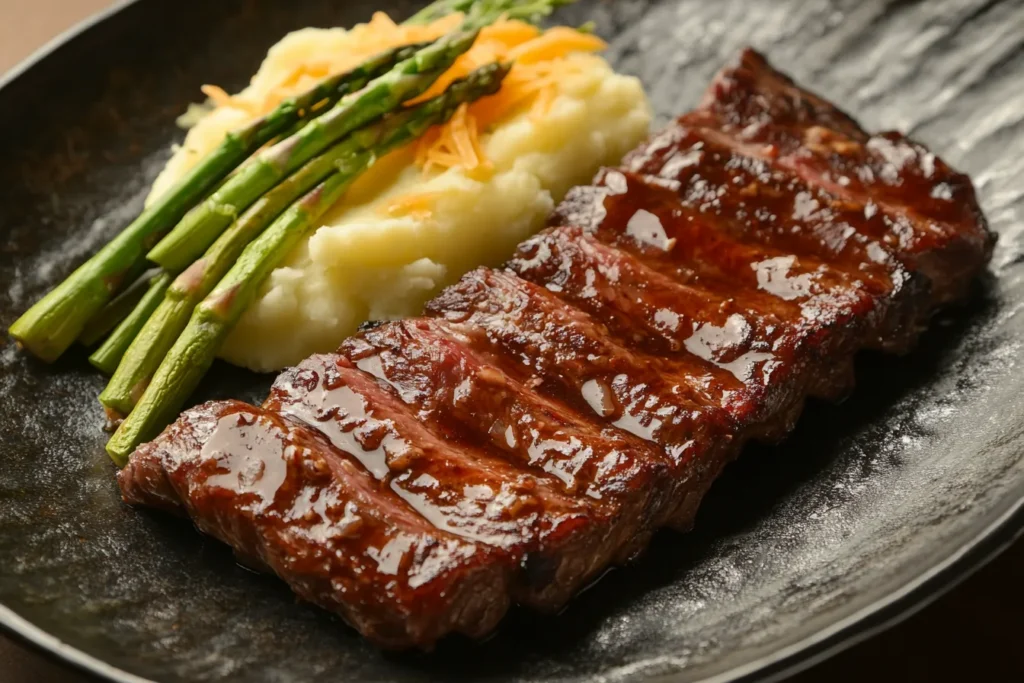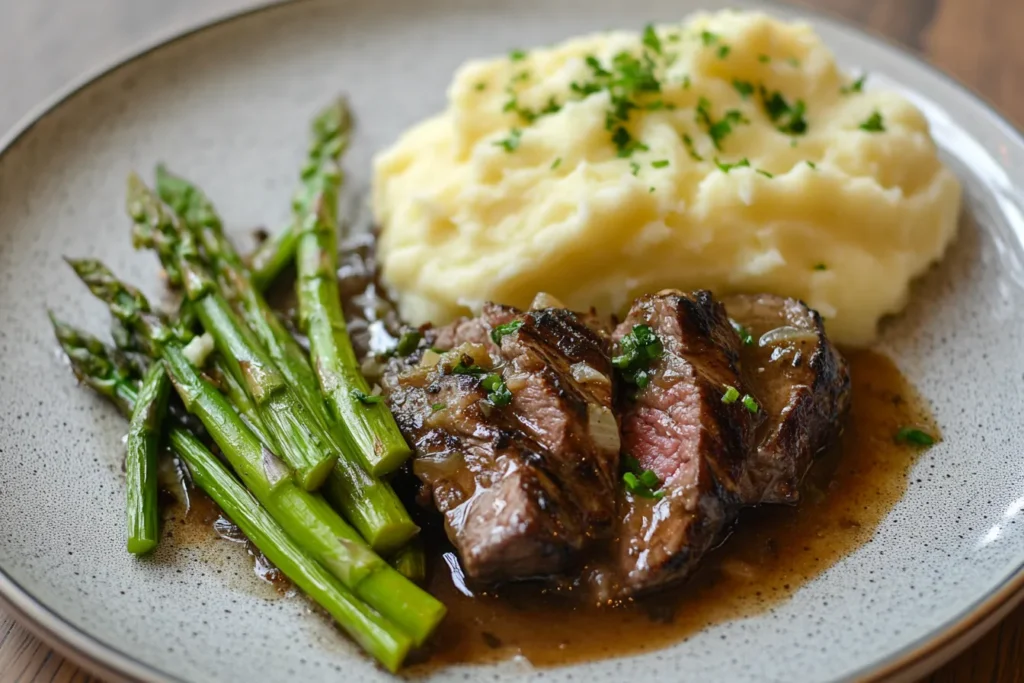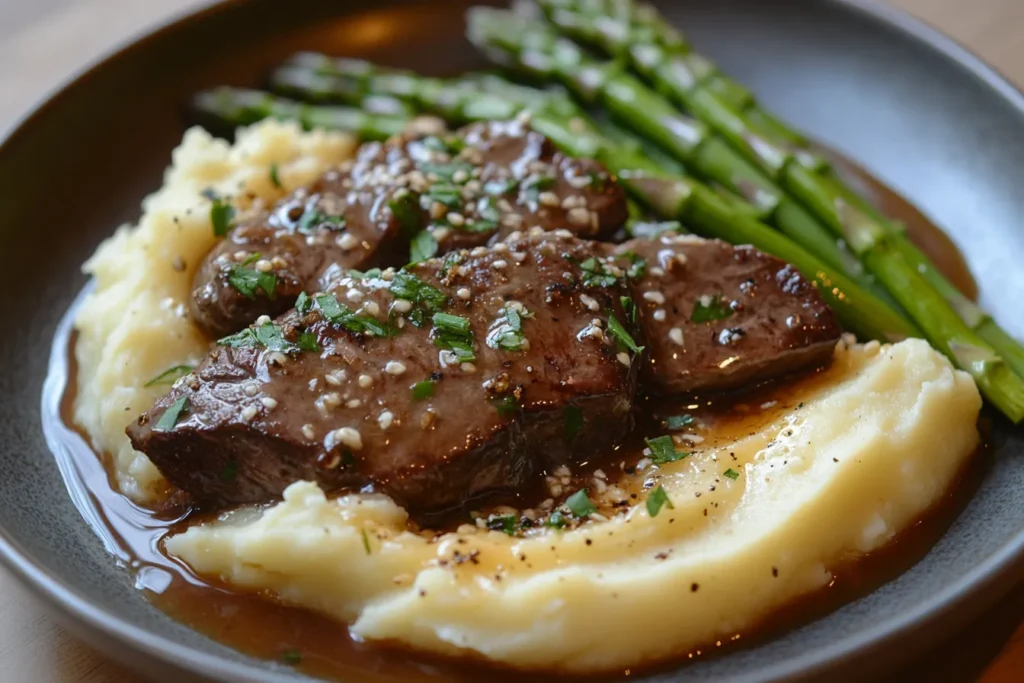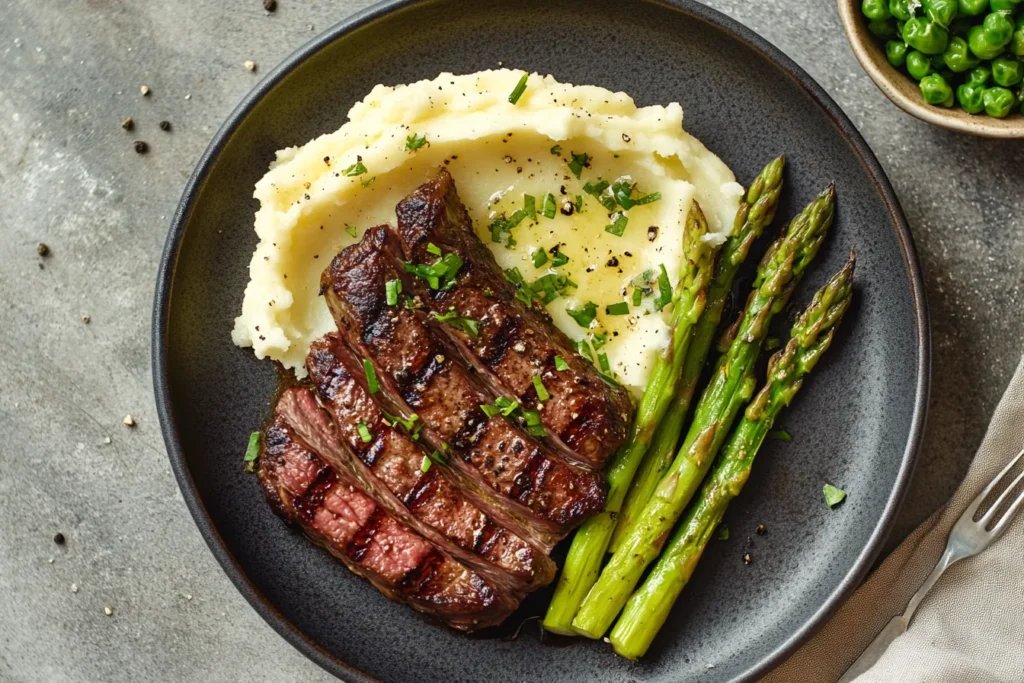Have you ever marinated a steak, expecting juicy perfection, only to be disappointed by tough or overpowering results? You’re not alone! While marinades can take your steak to the next level, choosing the wrong ingredients can quickly ruin the flavor and texture. It’s frustrating to put in the effort, only to end up wondering, “What went wrong?” I’ve been there too—thinking more was better, only to learn the hard way that some ingredients just don’t play nice with steak. Don’t worry, though! Once you know what to avoid, marinating becomes easy and foolproof. Let’s break down the ingredients you should skip so your steak always turns out tender and delicious!
List Of Contents
What is a Marinade?
A marinade is a seasoned liquid mixture used to flavor and tenderize meat before cooking. The process involves soaking the steak in a blend of acids, oils, and spices, allowing the flavors to seep in. Marinades also serve to tenderize tougher cuts of meat, enhancing their texture.
For those new to cooking, think of marinades as the first step to infusing a steak with complexity and depth. However, while the benefits are significant, it’s easy to overdo it or use the wrong ingredients. Check out more recipes here.
The Science Behind Marination
Understanding the science of marinating helps to avoid common errors. When acids like vinegar or citrus juice come into contact with steak, they break down proteins, making the meat tender. Oils, on the other hand, lock in moisture, and seasonings enhance the taste.
However, it’s important to note that marinades primarily affect the surface of the meat. Despite popular belief, they rarely penetrate deeper than a few millimeters. Misjudging this can lead to a flavor imbalance or an unappealing texture. Check out more recipes here.
Key Ingredients of Effective Marinades

Successful marinades usually consist of:
- Acids: Lemon juice, vinegar, or yogurt, which tenderize the meat.
- Oils: Olive or sesame oil, to keep the steak moist.
- Seasonings: Garlic, herbs, and spices, to elevate the flavor profile.
The balance between these components is vital. Too much acid can make steak mushy, while excess oil can block flavor absorption.
Common Mistakes in Marinating Steak
Despite the simplicity of the process, marinating can go wrong in several ways:
- Over-marinating: Leaving steak in a marinade for too long can ruin its texture.
- Imbalanced ingredients: Using too much acid or salt can overpower the steak.
- Wrong marinade for the cut: Not all steaks require the same treatment. For instance, tender cuts like filet mignon rarely need marination.
Mistakes like these can lead to wasted effort and a less-than-perfect dish.
The Role of Acidity in Marinades
Acid is a double-edged sword. While it tenderizes, it can also “cook” the meat if left too long. This chemical process, known as denaturation, can make the steak tough and unappetizing.
To avoid this, always limit acidic marinades to a few hours. Cuts like skirt or flank steak, which are naturally tougher, benefit most from acids.
Proteins in Steak: Why Marinades Matter
Steak is composed of proteins that dictate its texture and flavor. Marinades interact with these proteins, enhancing tenderness and taste. However, overexposure to certain ingredients, like high acidity or strong enzymes, can disrupt this delicate balance, leaving the steak chewy or rubbery.
What Happens if You Use the Wrong Ingredients?
Using unsuitable ingredients can spell disaster. For example:
- High salt levels can dehydrate the steak.
- Overly acidic mixtures can break down proteins excessively.
- Strong artificial flavors can overpower the steak’s natural essence.
Myths About Marination
Several misconceptions persist about marination:
- Myth: Marinades soak deep into the meat.
- Truth: Marinades only penetrate the surface.
- Myth: Any steak benefits from marinating.
- Truth: Premium cuts rarely need a marinade.
Understanding these myths can save you from unnecessary culinary frustration.
Steak Types That Don’t Require Marinades
Not all steaks benefit from marination. High-quality cuts like ribeye or tenderloin are naturally flavorful and tender. Instead of a marinade, a simple seasoning of salt and pepper enhances their inherent qualities.
How Timing Impacts Steak Marination
Timing is everything when it comes to marinating. While some cuts can handle overnight marination, most steaks only require a few hours. Overdoing it can result in an unpleasant, mushy texture.
- Short marination (30 minutes – 2 hours): For delicate cuts.
- Long marination (4-6 hours): For tougher steaks like skirt or flank.
Ingredients to Avoid in Steak Marinades
While crafting a marinade, selecting the wrong ingredients can sabotage your steak’s flavor and texture. Avoiding these pitfalls is key to ensuring a perfectly marinated steak. Let’s dive into what not to marinate steak with and why.

1. High-Salt Marinades
Salt is essential in cooking, but too much can wreak havoc on a steak. Excess salt draws moisture out of the meat through a process called osmosis, leaving the steak dry and tough.
- Why to avoid: High-salt marinades dehydrate steak, compromising its tenderness.
- Tip: Use salt sparingly and balance it with oils or acidic ingredients. Alternatively, sprinkle salt just before grilling for a natural crust.
2. Overly Acidic Ingredients
Acids like vinegar, lemon juice, or lime are common in marinades. However, using them in excess or for extended periods can “cook” the steak’s exterior, making it mushy and overly soft.
- Why to avoid: Overexposure to acids breaks down proteins too aggressively.
- Tip: Limit the marination time when using acidic ingredients—1-2 hours is ideal for most cuts.
3. Sugary Ingredients
Sugar is often used to balance savory flavors in a marinade, but too much can cause issues when cooking. Sugar caramelizes quickly under high heat, leading to burnt spots that taste bitter.
- Why to avoid: High sugar content results in uneven cooking and a charred taste.
- Tip: If you enjoy sweetness, opt for natural sweeteners like honey or maple syrup, and use them sparingly.
4. Alcohol-Based Marinades
While alcohol can add depth to marinades, it’s a tricky ingredient to handle. Undiluted alcohol toughens steak by coagulating its proteins too quickly. Additionally, alcohol doesn’t contribute much flavor unless it’s cooked off.
- Why to avoid: Undiluted alcohol can make steak chewy and unappetizing.
- Tip: Always dilute alcohol with water or oil, and let it evaporate partially before marinating.
5. Dairy Products
Milk-based marinades like buttermilk or yogurt work well for chicken but can backfire with steak. Dairy’s enzymes and proteins interact poorly with beef, sometimes leaving a slimy texture.
- Why to avoid: Dairy marinades don’t penetrate steak well and can create an unpleasant consistency.
- Tip: Save dairy marinades for poultry or fish and stick to oil- and acid-based options for steak.
6. Spices That Overpower
Strong spices like cloves, cumin, or star anise can dominate the natural flavor of steak. When used excessively, they overshadow the meat’s unique taste profile.
- Why to avoid: Overpowering spices mask the steak’s flavor instead of complementing it.
- Tip: Focus on subtle seasoning. Use bold spices sparingly or combine them with neutral flavors like garlic and onion.
7. Too Much Oil
Oil is an essential marinade component, but overusing it creates problems. Excess oil forms a barrier that prevents other ingredients from penetrating the steak, limiting the marinade’s effectiveness.
- Why to avoid: Too much oil blocks flavors from infusing into the steak.
- Tip: Use just enough oil to coat the steak lightly, and balance it with acids or seasonings.
8. Raw Papaya or Pineapple Enzymes
Papaya and pineapple are often used for their natural enzymes, which tenderize meat. However, these enzymes can work too quickly, breaking down proteins and leaving steak with a mushy texture.
- Why to avoid: Excessive enzymatic tenderizing results in overly soft meat.
- Tip: Use papaya or pineapple marinades for no longer than 30 minutes.
9. Liquid Smoke or Artificial Flavors
Liquid smoke can add a smoky flavor to marinades, but its artificial taste can overwhelm the steak. Similarly, synthetic flavorings rarely blend well with natural ingredients.
- Why to avoid: Artificial flavors lack depth and can taste chemical or fake.
- Tip: For a smoky flavor, grill over charcoal or wood chips instead.
10. Pre-Packaged Marinades with Preservatives
Pre-made marinades may seem convenient, but they often contain high levels of salt, sugar, and preservatives. These ingredients can negatively impact flavor and texture.
- Why to avoid: Packaged marinades limit control over the final taste and can make the steak unhealthy.
- Tip: Make your marinades from scratch to customize the flavor and avoid harmful additives.
Why Avoiding These Ingredients Matters

By steering clear of these problematic ingredients, you preserve the steak’s natural qualities. The goal of marination is to enhance, not overpower, the meat.
- Avoiding high-salt and overly acidic marinades prevents dehydration and textural issues.
- Limiting sugar and artificial flavors ensures the steak cooks evenly and tastes authentic.
- Balancing enzymes and spices allows the steak’s flavor to shine without being overshadowed.
This level of attention to detail results in a perfectly cooked steak every time.
Practical Tips for Avoiding Mistakes
- Always taste-test your marinade before applying it to steak.
- Keep marination times within the recommended range for each ingredient.
- Pair the marinade with the right steak cut—some cuts don’t benefit from marinating.
- Store marinating steak in the fridge to prevent spoilage.
Best Practices and Alternatives
Crafting the perfect steak marinade is about balancing flavors, preserving texture, and enhancing the natural taste of the meat. But what if marinades don’t always fit the bill? In this section, we’ll explore best practices for creating effective marinades, along with smart alternatives and solutions to common mistakes.
1. Balancing Flavors in a Marinade
A great marinade combines four key flavor components:
- Sweet: Adds depth and balance (e.g., honey, brown sugar).
- Sour: Provides brightness and tenderization (e.g., vinegar, citrus juice).
- Salty: Enhances flavor without overwhelming (e.g., soy sauce, sea salt).
- Spicy: Introduces heat or complexity (e.g., chili flakes, black pepper).
How to Achieve Balance
- Use a 2:1 ratio of oil to acid as a starting point.
- Gradually incorporate sweeteners and spices, tasting as you go.
- Keep the marinade simple to let the steak shine.
Balancing flavors ensures that no single ingredient dominates the dish, resulting in a harmonious bite every time.
2. Tips for Choosing Acidic Ingredients
Acid is a key tenderizer but must be used wisely. Some acidic ingredients, such as citrus or vinegar, can overpower or over-tenderize the meat.
Effective Substitutes
- Use milder acids like wine, apple cider vinegar, or buttermilk for a gentler effect.
- Combine stronger acids with oils to temper their intensity.
Acid selection is particularly important for tougher cuts like skirt steak, which benefit most from tenderization without losing texture.
3. Healthier Alternatives to High-Salt Marinades
Too much salt can dehydrate steak, while store-bought options often contain sodium overload. Instead, consider healthier, flavor-packed alternatives.
Natural Flavor Boosters
- Herbs: Rosemary, thyme, or parsley for aromatic depth.
- Garlic and Onion: Freshly minced or powdered versions.
- Citrus Zest: Adds brightness without adding acid.
Using fresh ingredients reduces sodium dependency while enhancing the steak’s flavor profile.
4. Perfecting the Oil to Acid Ratio
A common issue with marinades is misjudging the ratio of oil to acid. Too much oil prevents absorption, while too much acid can “cook” the meat.
The Ideal Consistency
- Aim for a consistency where the marinade lightly clings to the steak.
- Use 1/3 cup of acid and 2/3 cup of oil for every pound of meat.
A well-balanced ratio ensures even flavor distribution and prevents over-tenderization.
5. Experimenting with Dry Rubs Instead of Marinades
Sometimes, dry rubs are a better choice than liquid marinades. Dry rubs create a flavorful crust and are ideal for premium cuts that don’t need tenderization.
Why Choose a Dry Rub?
- Retains the steak’s natural juiciness.
- Enhances flavor without altering texture.
- Reduces prep time compared to marinades.
Dry Rub Ingredients
- Salt and pepper for a basic crust.
- Paprika, garlic powder, and cayenne for a smoky kick.
- Brown sugar for a subtle sweetness.
Dry rubs work exceptionally well on cuts like ribeye or T-bone, where the goal is to amplify, not mask, the steak’s natural flavor.
6. Using Marinades Wisely with Different Steak Cuts
Not all cuts require the same treatment. Tougher cuts, like flank or skirt steak, benefit from marination, while tender cuts, like filet mignon, are better with simple seasoning.
Tailoring Marinades to Cuts
- Tough cuts: Use marinades with acids and oils to tenderize.
- Tender cuts: Focus on subtle seasoning or dry rubs.
- Thick steaks: Marinate longer to ensure the flavor reaches deeper layers.
Understanding the needs of each cut prevents unnecessary marination and ensures the best results.
7. How to Salvage Over-Marinated Steak
Over-marinating happens to even the best cooks. If your steak has turned too mushy or salty, there are ways to salvage it.

Quick Fixes
- Rinse the steak under cold water to remove excess salt or acid.
- Pat dry and apply a dry rub to restore texture.
- Grill at high heat to create a crust, which offsets mushiness.
With these tricks, you can still rescue an over-marinated steak and enjoy a delicious meal.
8. Safe Marinating Practices
Food safety is critical when working with raw meat. Improper marination can lead to cross-contamination or spoilage.
Safety Tips
- Always marinate steak in the refrigerator to keep it safe, avoiding room temperature.
- Use non-reactive containers like glass or plastic.
- Discard used marinade or boil it before reusing as a sauce.
These practices ensure both safety and quality in your steak preparation.
9. Understanding Marinade Penetration
A common misconception is that marinades soak deeply into the meat. In reality, most marinades only affect the surface.
Why This Happens
- Meat’s dense structure limits how far liquids can travel.
- Marinades enhance the outer layer, while cooking spreads the flavor.
For thicker steaks, consider scoring the surface lightly to allow the marinade to seep in more effectively.
10. Creative Marinade Recipes That Work
If you’re looking for inspiration, here are some tried-and-true marinades:
- Classic Garlic Herb Marinade:
- Olive oil, garlic, rosemary, lemon zest, and a touch of balsamic vinegar.
- Sweet and Spicy Asian Marinade:
- Soy sauce, honey, sesame oil, ginger, and red chili flakes.
- Smoky Chipotle Marinade:
- Chipotle peppers in adobo, lime juice, and a splash of orange juice.
Experimenting with different combinations allows you to tailor marinades to your personal taste preferences.
Final Thoughts
Avoiding common pitfalls and embracing best practices ensures your steak reaches its full potential. Whether you choose a liquid marinade, a dry rub, or a simple seasoning, the key is to enhance the meat’s natural qualities without overpowering them. By balancing flavors, tailoring techniques to specific cuts, and prioritizing safety, you can create a steak that’s both tender and flavorful every time.
FAQs
- Can I reuse leftover marinade?
- Yes, but only after boiling it to kill bacteria.
- How long should I marinate steak?
- Typically 2-6 hours, depending on the cut and ingredients.
- What’s the best container for marinating steak?
- Glass or plastic containers are ideal; avoid metal bowls.
- Is marinating steak overnight safe?
- It depends on the marinade. Avoid leaving acidic marinades overnight.
- Can I marinate frozen steak?
- Thaw the steak first to ensure even flavor absorption.
- Does marinating steak tenderize it?
- Yes, but only the outer layers benefit from tenderization.
- Should I salt steak before or after marinating?
- Avoid salting before marinating unless the marinade lacks salt.
- What’s the best alternative to marination?
- Dry rubs are an excellent alternative, especially for premium cuts.
- Can you over-marinate steak?
- Yes, over-marinating can result in mushy texture and overpowering flavors.
- Do all marinades work on every cut?
- No, marinades should be tailored to the cut’s needs.
